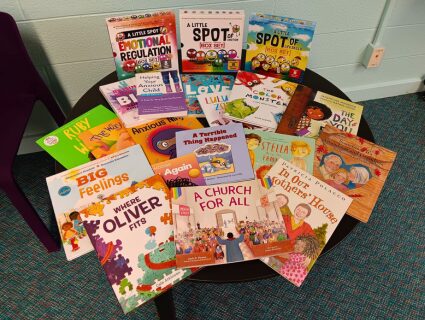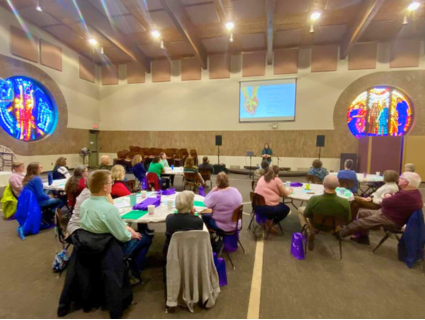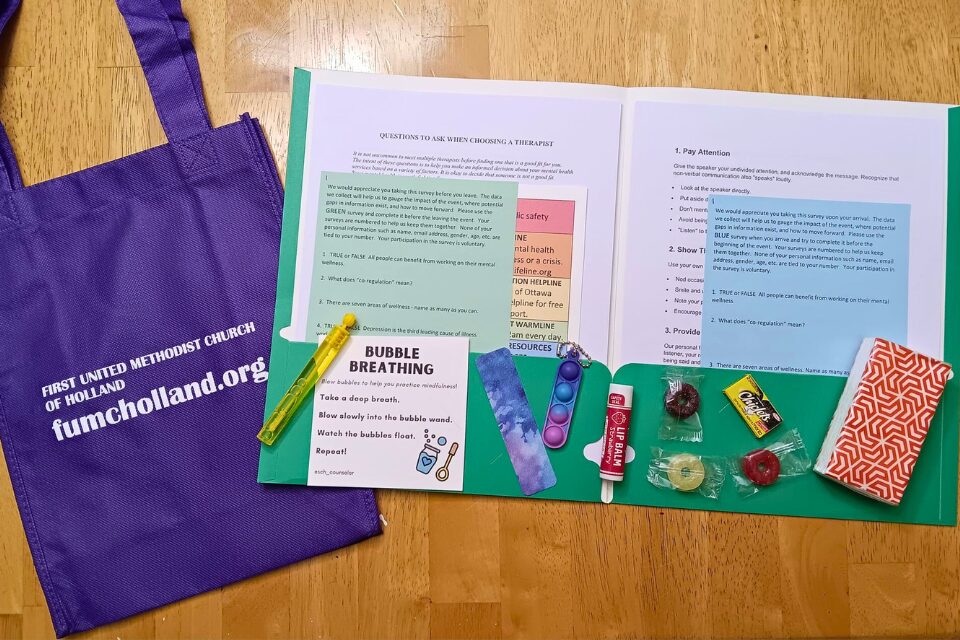Holland: First UMC is taking bold steps to educate their congregation and make their spaces more inclusive for those challenged by mental illness.
FAITH GREEN TIMMONS
Michigan Conference Communications
Growing up in the church, Jill DeJonge always felt loved, included, and important. She says the church was a safe place for her, but the one thing she felt was missing was knowledge and an understanding of how to help her. From an early age, she struggled with anxiety caused by a mental health disorder.
Today, DeJonge is the new Director of Children’s Ministries at Holland: First United Methodist Church. One of her initial goals, stepping into this new role, has been to help those who struggle socially due to mental, neurological, and emotional challenges. She started by educating the congregation.
DeJonge recruited a Mental Health Ministry Team. It consists of two medical doctors and a therapist with a teaching background, all of whom are members of the congregation. “We try to normalize mental health. It is just as important as physical health. Over the past couple of years, many people have felt isolated,” said DeJonge. Together, members of this new team worked to develop a safe space where members of the congregation could have this conversation.
Next, they added a low-sensory worship space with low lighting, muted music, and low-sensory objects to hold or sit on, like soft toys, plush pillows, and blankets. Holland: First began implementing elements of this plan before the COVID-19 pandemic. It went into high gear when DeJonge joined the staff. Feeling compelled to share her personal journey, she approached the clergy staff, proposing ideas for addressing special needs that are often unmet. The entire staff, followed by the congregation, embraced the opportunity to complete and add to these projects.

The church’s leadership style aided in these efforts. This uniquely all-female staff operates within an egalitarian structure. Rather than a pastoral hierarchy, with a senior pastor and an associate who assists, the Reverends Tish Bowman, Tania Dozeman, and LuAnne Stanley Hook make up the clergy team. As co-pastors, they share the pastoral duties and rotate the preaching. For DeJonge, this welcoming environment made it easy for her to share her thoughts and ideas. “Jill has a heart for the care of the spirit and is working to meet needs in the church and the larger community,” said Rev. Dozeman. “She is a wonderful fit for this congregation. We are privileged to have the opportunity to work with a community of people who have not had the most positive church experiences. Some have experienced trauma and have mental health issues. This issue is near and dear to our hearts.”
The community near the church has vast needs. “We want to build trust,” said DeJonge. “Primarily, we are educating the congregation. We want all to understand these struggles, recognize and accept that many of us have them, remove the stigma, and find ways to help.”
Last month Holland: First offered a “Well-Being Sermon Series,” followed by a churchwide workshop to introduce strategies for addressing mental health needs, especially as it relates to children. As the Directory of Children’s Ministries, DeJonge created awareness among the ministry’s volunteers. Together, they set up alternative activities for children who exhibit fear or experience difficulty bonding. The role of the Mental Health Ministry Team is to develop, adapt, and present tools to help the church embrace those who initially may seem difficult to understand and serve effectively.
With the support of a Disability and Inclusion Grant from the Michigan Conference of The United Methodist Church, Holland: First has completed new projects, two of which are the Zen Zone and a Diversity and Inclusion Resource Library.

The Zen Zone is a designated area located within the children’s ministry. Rather than creating a separate area for what some might call overactive or assume to be problematic children, they are teaching people how to recognize better when children are overwhelmed. A dedicated space is always open to those needing a break from overstimulation.
The Diversity and Inclusion Resource Library offers curated materials selected for parents, teachers, and children to help them better understand the many needs of those with mental health struggles or learning differences. DeJonge explained, “Our teachers and Sunday school volunteers are learning many things, especially how to help children feel safe in our space.” Such practices include the following:
-
- Keep your distance when people are anxious.
- Explain what you are doing before inviting them to participate.
- Provide alternative options for those uncomfortable with particular group activities.
- Collect data when children enter the ministry, noting emotional and mental needs.
- Learn to recognize signs of childhood trauma, such as defiance, clinginess, fear, being overly quiet, lack of engagement with other children, and avoidance.
- If children exhibit concerning behaviors, rather than sending them away to another room, present options within view of the general play area that they can choose for personal solace when needed.
Rev. Tish Bowman is excited about their accomplishments: “Good mental health is as vital as physical and spiritual health. Nearly everyone we encounter is struggling with something, and these resources offer simple and helpful tools for us to use in our everyday lives.”
The Mental Health Ministry Team is working on plans for monthly presentations and events for sharing tools and promoting health and well-being. The newly formed advocacy team hopes to eventually reach beyond the church’s doors to the general community. Currently, they are developing support groups, inviting specialists, and hosting guest speakers for ongoing events open to the public.

Holland: First member Jamie Cusak attended the first event and commented, “I believe that the Mental Health Well-Being: Practical Tips and Strategies Workshop is important for everyone to attend. Every day, we may encounter friends, family members, co-workers, or just people in passing who are struggling with their mental health. This provides the necessary tools to reach out in a comforting way.”
Beth Peter is a member of the Mental Health Ministry Team. She explained why their work is both vital and timely: “Part of being a healthy congregation is being able to recognize and speak to mental health struggles. They are common and deserve nuanced support without stigma. Having a mental health professional lead interested church and community members in a safe space to talk through these issues is a first step into normalizing mental health as part of whole health.”
Speaking from personal experience, DeJonge added, “I am a highly sensitive person [also referred to as HSP], which means that I am easily overwhelmed. Because of that, I have learned to read the room when I enter a situation. One of my goals is to create awareness so others will recognize the need sometimes to do the same.” She stepped out in faith, sharing this personal history, and made herself vulnerable early on as a new member of the church staff. She felt validated by the support and affirmation she received when she broached the topic of a new ministry strategy. “However, it’s not just me,” DeJonge insisted. “I am riding on the coattails of others who served this church and laid the foundation for me. My predecessors did the not-so-fun work of tilling the ground and laying the groundwork. They helped prepare this church to embrace this new ministry with initiatives that began before I arrived.”
Holland: First UMC is an excellent example of a United Methodist congregation in Michigan taking mental health seriously and working to reduce the stigma surrounding mental illness. Other churches are encouraged to do similar work, for stigma is still present, education is needed, and not all persons in Michigan have access to affordable mental health care.
Looking for resources to help your congregation become a more caring and educated faith community on mental health matters? Check out the resources in the “Educate yourself and your congregation” section of this MIconnect article. Also, the Disability Ministries of The United Methodist Church has a host of resources and grant information for churches.
Want to do more and advocate for better mental health care access in Michigan? Join other United Methodists and friends from across the state for Advocacy Day on March 13, 2024, at the State Capitol in Lansing. A group from Holland: First has already signed up to attend in person. Click to learn more and to register.
Last Updated on February 20, 2024

